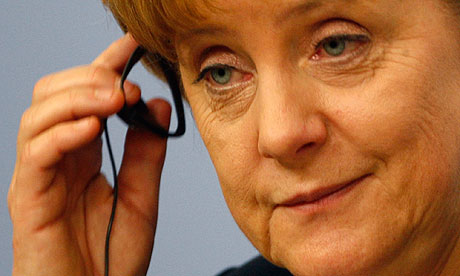In November last year, the parliamentary leader of Chancellor Merkel’s Christian Democratic Party declared during a party congress speech that “now, all of a sudden, Europe is speaking German.” He referred of course not to the language itself but rather to Germany’s debt brake as a role model adopted by other European countries like France or Spain.
However, the way in which Merkel’s ally commented on crisis management in other European states was just what European media was waiting for. British media, especially, saw a new German fourth Reich arising, and Greek media expected an invasion of a new generation of “Nazis.” Godwin’s law was proven yet again.
Despite all these silly remarks and impertinent comparisons, the statement epitomizes the current drive of European financial politics. Germany kept its Triple A rating (and will do so even if a recession might hit the country this year) whereas France and other Eurozone countries have been downgraded. Germany’s economy performs well with exports topping €1tn for the first time, and Germany took the lead in European crisis-management.
Eurosceptic British Prime Minister David Cameron meanwhile stews in his own juice celebrating himself as the last man standing against malicious Brussels. He has vetoed against a new treaty reform, not willing to jeopardize the City of London as global financial district. Cameron and his entourage avoid transferring any national power to EU level like the plague. Although, they are aware of the highly interdependent multi-level EU-game in which strict national sovereignty remains an illusion for cracker-barrel philosophers. But pacifying the domestic conservative clientele crippled by British nostalgia ranks higher on Cameron’s agenda than taking responsibility for Europe.And Nicolas Sarkozy is busy in his home turf campaigning for another presidential term. As Sarkozy faces bleak polls while his challenger Francois Hollande is on socialist cloud number nine, Europe has to take a back seat.
So, who would global leaders call if they want to talk to Europe? David Cameron? Nicolas Sarkozy? Not one of them. But Merkel.
Germany has obviously become the powerhouse of Europe during the crisis, whether Cameron and Co. like it or not. Merkel’s idea of a fiscal treaty is a preliminary success, backed by at least 25 member states. Only notorious EU-sceptic Czechs and, unsurprisingly, Great Britain will stay outside.
The German Chancellor has been touring across China to foster the country’s trust in the Euro and Europe. Confidence building is up to the German Chancellor – rather than to any other European statesmen.
Merkel also assisted, despite courting her coalition partner’s resentment, Sarkozy during a TV interview televised on French TV and German TV to express her support for a second presidential term of Monsieur Sarkozy. This friendly turn however is less a sign of Franco-German sympathy than of Merkel’s instinct for power. Sarkozy has been a relatively reliable partner during the crisis and will be easy to predict. Another five years Sarkozy would thus fit into Merkel’s plans.
And what about the other European member states? It seems some European leaders have lost their voice. At least, many of the European would-be-troubleshooters remain remarkably quiet when asked for feasible solutions to alleviate the crisis. And repeating rallying calls are anything but new. Where are the groundbreaking proposals to save Greece and the Euro, if not the Union itself?
Finding this leads back to the initial quotation and asking: Does Europe really speak German? Certainly not. Europe’s crisis-speak is typically polyphonic. However, when listening to Europe right now, we can pick out one thing: a strong German accent.


